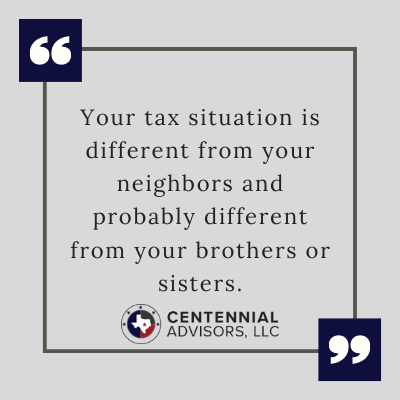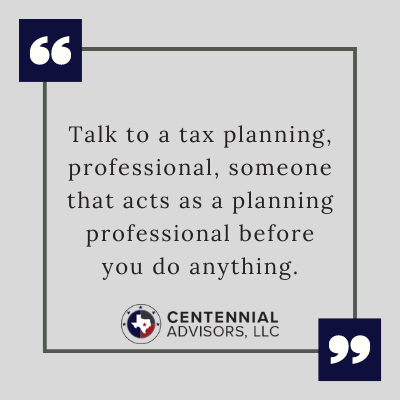Transcript
Mike:
Today, we’re looking to tackle the question about Roth conversions. Should you convert IRA or 401k money to Roth, or should you not now, before we dive into this and I, my goal today is to give you some guidelines. So just just general guidelines to help you focus on moving in a positive direction one way or another. But before I do that, remember taxes are different for everyone. Your tax situation is different from your neighbors. Tax situation is probably different from your brothers or sisters tax situation. The tax code is unfortunately very complex and it can lead to some strange outcomes when you take the same strategy and apply it to different people. So before you take anything I talk about today and apply it in your unique situation, please make sure. And I mean, please make sure you’re talking to a tax planning professional. Now, should you do Roth conversions or not?
Mike:
I have a very simple framework to share with you to help answer that question. And it goes like this. Let’s imagine a simple cross here, and this is really a matrix and we’re going to compare two moving parts here. So first is going to be time on this side is today and on this side is tomorrow. Here’s where we are on the left today. And over on the right down the road. And tomorrow might be after retirement is when it usually is in this discussion, but not always. Here’s the other thing, the other access that we need to look at low tax brackets and high tax brackets.
Mike:
Those are the moving parts. Let’s imagine that you’re going to be in a low tax bracket both today. Let’s say you’re in a low tax bracket today, and you’re going to be in a low tax bracket tomorrow. So we’re like, wow. Low taxes plus plus, yeah, we’re in low tax brackets today. We’re going to be in low tax brackets tomorrow then probably we would say let’s use red. No, we probably don’t want to do any Roth conversions because doing a Roth conversion today might put you in a higher tax bracket. But if you’re just trying to avoid a low tax bracket later on, well then what did you do yourself warning with this one warning. If you have a large IRA, let’s say your IRA or your 401k is like a million dollars. You might be thinking, oh, I’m going to be in a low bracket today and a low bracket tomorrow.
Mike:
I’m cool. Not so fast. Cause that brings up situation. Number two. What if you’re in a low tax bracket today? You think you’re going to be in a low tax bracket when you’re retired, but because your IRA is so big, the required distributions are actually going to put you up here. You’re like, oh, I’m in a low tax bracket today, down here. Yay. But I’m going to be in a high tax bracket when I retire because my stupid required minimum distributions are going to put me there. Well, if that’s the case, then bomb, we’re going to go green. Yes, you should do. Or at least look at doing Roth conversions in that example. And in that example, you’re probably in a position where you should be thinking about filling up either the 22% bracket. I would even encourage you to be open-minded to getting a little more aggressive in filling up the 24% brackets.
Mike:
And when you look at the higher tax brackets in retirement, here’s a pro tip. Make sure you’re looking at the tax brackets that were in place in 2017 because those tax brackets under current law are supposed to come back into force starting in 2026. Well, what if you’re up here in this zone, you’re in a high tax bracket today. So I’ve got this situation all the time where you’ve got a couple they’re working. They’re in their late fifties, early sixties, they’re making tons of money, like a couple hundred grand a year. Each they’re making like 400,000 a year yet and they’ve paid off all their debt. And by the time they retire, they’re only going to live on maybe a hundred thousand a year, one 50, a fraction of what they’re getting now, their tax bracket is definitely going to go down in retirement and let’s imagine further that they do not have big IRAs or 401ks that would cause them to bump an IRA tax brackets again in retirement.
Mike:
So we know they’re going to be in lower tax brackets in retirement, if that is the case. So they’re here today, but they’re moving down to here in retirement. Then we’re going to say no, do not do Roth conversions right now. Generally what’s our last scenario. Our last scenario is we said, oh, we’re up here? Right? High tech. You know, we’re in big tax bracket today. And oh my goodness, we are likely going to stay in a high tax bracket in retirement. We’re going to be high tax bracket today and high tax bracket in retirement. Then if that’s a situation, yes, you should look at doing conversions. And guess what? Your, the unique individual that should consider the I’m going to put it right here, all at once approach. You’re the person that should look at just converting all of it now. And it’s going to stink because you got to write this huge check to the IRS to do it.
Mike:
Or if you’re over the age of 59 and a half, you can withhold the tax, which makes a little easier. But if you’re a person you’re in a high tax bracket today, you’re going to be high tax brackets later in life. I’m sorry, but here’s the deal. You will never pay less tax on your retirement account than right now. Get your money out of there. Get it out of there now fast. And I promise you, I look, I’ve had a number of clients do that. And so far a hundred percent of them have looked back in later years and they tell me after they’ve done it, you know, two, three years later, they look back and they just say, gosh, Mike, thank you for telling me to do that conversion all at once, best move I ever made. I’m just telling you we’re in an environment where tax rates are likely to get higher and higher and higher and higher.
Mike:
And if you’re going to be in a high tax bracket, both today and later on, you’re going to be exposed to those tax brackets are getting higher and higher and higher and higher. And your retirement accounts are going to be fully exposed to those brackets. Getting higher, higher, higher, higher, just getting rid of the IRS out of your life now and just say, okay, get outta here, pay it all now so that I don’t have to deal with it later can make a lot of sense. In fact, I’ve seen situations where it even makes sense where by paying it all. Now that takes you from a high tax bracket in retirement up here, and actually drives you down here and a really low tax bracket for the rest of your life. So that could be a really good approach for you. Number one, low today, low later, no, no Roth conversions and low later is accounting for required distributions later in life, too low tax bracket today.
Mike:
But you’re going to be in a higher tax bracket later, probably because of required distributions from your retirement accounts, then yes. And you want to try to fill the 22% bracket. That’s usually a no brainer. And I would encourage you to also look at filling the 24% brackets three I’m in a high bracket today. And I’m probably going to be oops. I said in a low bracket later on high bracket today, but low bracket in retirement, then no, no need to do Roth conversions today. Now remember low bracket retirement means, Hey, you’re big timers today, retired to a much lower income and required distributions down the road will not cause a problem. And then finally, high bracket today, high bracket in retirement. Then this is where not only is it yes, you may want to consider. And I know it costs a boatload of tax right now to do it. Consider a full 100% conversion, nothing partial. Do it all now or do it all within the next couple of years in the next two, three years is your tax situation different from your neighbors and everybody else’s. It is. These are guidelines. They are not set in stone. Talk to a tax planning, professional, someone that acts as a planning professional before you do anything, hope this helps. That’s our message this week. Talk to you again soon.

